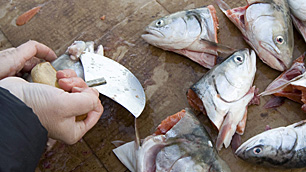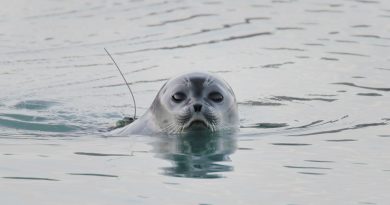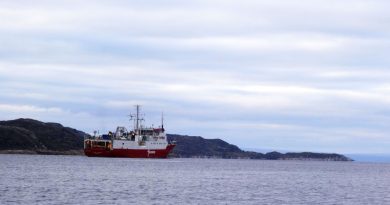Indigenous leader wants clarity on impacts from mines outside of Canada’s Northwest Territories

The withdrawal of Teck Resources Ltd.’s application to develop a new oilsands project in northeastern Alberta has not silenced concern in the North — that N.W.T. interests were never fully considered or defended by the territorial government.
Smith’s Landing First Nation Chief Gerry Cheezie says he wants to meet with the N.W.T. government about how it handled the Teck Frontier oilsands mine project application. The oilsands project would have had implications for the Northwest Territories watershed, as it’s downstream from the proposed mine’s location, 110 kilometres north of Fort McMurray, Alta.
“It seems like they’re just sitting here and not taking this seriously and standing up for our people,” Cheezie said.
Cheezie said he was “happy” with the decision by Teck Resources to withdraw its application, but he remains troubled by the N.W.T. government’s level of involvement as the project neared a federal decision.
He wants to know how the government will treat other threats to N.W.T. water, including the potential release of 1.3 trillion litres of tailings water into the Athabasca River.
N.W.T. was communicating with Alberta: minister
Before Teck announced its withdrawal, Cheezie contacted N.W.T. Environment Minister Shane Thompson with concerns.
To deny us a seat at the table to protect our interests is a real shame for [Alberta].– Gerry Cheezie, Smith’s Landing First Nation chief
Thompson said he is open to meeting with Cheezie, but disagreed with Cheezie’s suggestion that the government waited too long to intervene. The N.W.T. was communicating with Alberta — just not publicly, Thompson said.
He said some people “maybe be unhappy” the government did not take a stance, but it was using the tools at its disposal, including the 2015 transboundary water agreement between Alberta and the N.W.T.
According to an emailed statement attributed to Minister Thompson, the N.W.T. government didn’t make submissions on the Teck project because when the environmental assessment for the Frontier mine started in 2012, the government was still negotiating the agreement with Alberta.
Thompson said the territorial government’s concern over upstream development was central to those negotiations.
Before Teck withdrew its application, Thompson wrote a letter to Alberta’s environment minister reaffirming both governments’ shared commitments under the transboundary water agreement to consult each other if a project will affect shared waters.
Alberta says First Nation didn’t identify specific sites
Jess Sinclair, press secretary to Alberta Environment Minister Jason Nixon, acknowledged Thompson’s letter.
She said “all directly affected First Nations” were consulted on Teck Frontier and that 14 Indigenous governments signed agreements with the company.
Asked to comment on opposition to the project in the N.W.T., a spokesperson for Teck Resources sent a news release that says a “vocal minority” will “inevitably oppose” certain developments without specifying who that vocal minority is.
It says the company is proud of the benefit agreements it signed and the work of the Alberta government.
Sinclair said when Alberta’s Aboriginal Consultation Office contacted Smith’s Landing, the First Nation didn’t identify specific sites for mitigation or avoidance.
But Cheezie said “a phone call, or a letter is not consultation.”
“It’s gotta be meaningful. It’s gotta be done in such a way that we have a say. Basically they said we’re not impacted and so we don’t need to talk to you,” he said.
The day after the Frontier project was cancelled Cheezie held a meeting in Smith’s Landing to talk about how the nation “struggled to get recognition” by the Alberta Joint Review Panel.
He said Alberta was in “denial” of downstream impacts, adding that there is scientific proof of cumulative impacts.
Was it just, somebody was asleep at the wheel, or they didn’t want to ruffle any feathers with Alberta?– Kevin O’Reilly, N.W.T. MLA
“They were saying we had nothing to be worried about and we don’t agree with that,” he said.
“For them to deny us a seat at the table to protect our interests is a real shame for the province of Alberta and for the federal government, in order for some corporation to make a profit over the lives of my people.”
What did the N.W.T. government do on Teck?
MLA Kevin O’Reilly said he is “not sure” the government took all of its opportunities to have input on Teck.
He said the public deserves to know what steps the N.W.T. government took, and whether it invoked provisions of the transboundary water agreement.
“If not, why not? Was it just, somebody was asleep at the wheel, or they didn’t want to ruffle any feathers with Alberta?” O’Reilly said.
He said the territorial government should act before there are impacts to water.
“If you only wait until you detect changes, guess what? It’s too late,” O’Reilly said.
Environment Minister Thompson acknowledged that there’s “always room for improvement.” He said Indigenous governments and organizations across Canada participate in a steering committee for bilateral water management.
But Chief Cheezie said Alberta “doesn’t care” about downstream pollution.
Cheezie said ignoring Indigenous people and their concerns is driving blockades and protests across the country related to Wet’suwet’en opposition to the Coastal GasLink natural gas pipeline project in northern B.C.
“Indigenous governments have given the signal to government that they can’t continue to deny us and ignore us. Or these things will continue to happen,” he said.
Related stories from around the North:
Canada: Air links between Canada, Alaska, Greenland & Siberia could be building blocks for economic development says Quebec Inuit leader, Eye on the Arctic
Finland: The Arctic Railway – Building a future or destroying a culture? Eye on the Arctic
Norway: Novatek touts Arctic LNG projects at Norwegian conference, declines media questions, The Independent Barents Observer
Russia: Inuit from Alaska, Canada, Greenland & Russia condemn U.S. torpedoing of Arctic Council declaration, Eye on the Arctic
Sweden: Indigenous reindeer herders request emergency aid after drought, wildfires ravage Sweden, Eye on the Arctic
United States: Bill to protect ANWR passes early hurdle in Washington, CBC News



